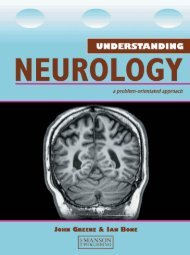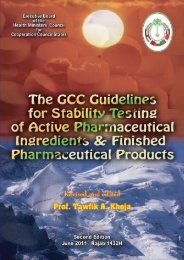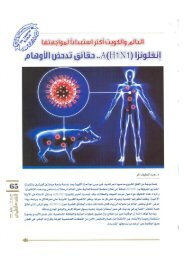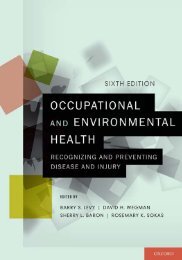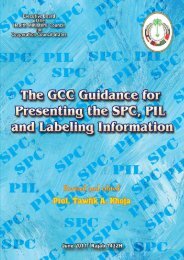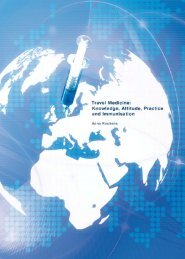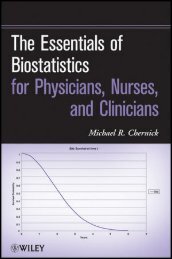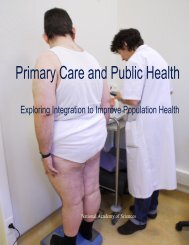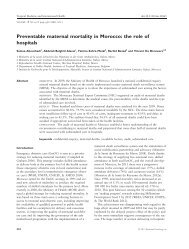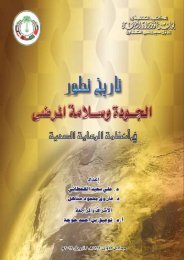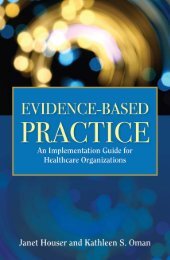NMS Q&A Family Medicine
NMS Q&A Family Medicine
NMS Q&A Family Medicine
- No tags were found...
Create successful ePaper yourself
Turn your PDF publications into a flip-book with our unique Google optimized e-Paper software.
70 <strong>NMS</strong> Q&A <strong>Family</strong> <strong>Medicine</strong>Examination Answers1. The answer is B. Hydrochlorthiazide does not reduceinsulin resistance. In susceptible individuals, hctz can precipitatetype II diabetes mellitus, albeit reversible upondiscontinuance. Hctz is a distal loop diuretic, which is aquite serviceable antihypertensive, tending to functionthereby in people who have a tendency to retain salt andwhose hypertension may respond to dietary salt restriction.Hctz does cause excretion of sodium and potassium,the latter to pathological proportions on occasion. Hctzcauses a slight elevation of serum calcium and in thatrespect tends to preserve bone calcium, for example, inthose that might be susceptible to osteoporosis.2. The answer is C. Furosemide, as a proximal loopdiuretic, does not normally have an antihypertensivepharmacologic effect. However, as renal function is compromisedfrom whatever cause, it becomes an antihypertensivediuretic. Capoten, as an ACE inhibitor, would beredundant along with lisinopril; triampterene, a weakdiuretic, has virtually no effect on BP but works well withother diuretics due to its potassium-saving effect. Hydrochlorthiazidehas been discussed. Amiloride is a potassiumsavingweakly antihypertensive diuretic.3. The answer is D. Beta-adrenergic blockade does notwork well in conjunction with alpha 2 stimulants; thus,that is the incorrect statement. In fact, particularly becauseclonidine remains a popular antihypertensive drug, it isimportant for the clinician to know that both betablockersand alpha 1 -blocking agents do not work wellwith alpha 2 blockers. Alpha 2 stimulants may be misnamedbecause their therapeutic application is the sympatholytic/antihypertensiveeffect. At high dosages, alpha 2 stimulantsdo stimulate peripheral alpha 2 receptors and raiseBP, as do reflexly both alpha 1 and beta-blockers. Alpha 2stimulants are characterized by predisposition to a hypertensivediscontinuance syndrome that features also tachycardia,anxiety, and tremulousness. Alpha 2 stimulants asantihypertensive agents work well in conjunction withantihypertensive diuretics.4. The answer is A. A thiazide diuretic is the least likely ofthe choices given, to be effective in the case presented.This patient manifests the characteristics of hypertensionbased on the elevated peripheral resistance as a preponderantmechanism. The patient’s vignette suggests thatthe person is sensitive to or responsive to sympathomimeticmechanisms (i.e., the “hot reactor”). As such, thepatient’s BP is more likely to respond to ACEIs, ACEreceptor blockers, beta-blockers, or CCBs rather than todiuretics. Failure of the patient to respond to salt restrictionsupports the theme, as diuretic responsive hypertensionis based on salt and water retention that increasesvolume. Thirty-five percent of whites and Asians, if hypertensive,respond to diuretics, particularly thiazides. Allothers respond to the other drugs to varying degrees,often in combination with the other classes mentioned.Ultimately, many cases manifest mixed pathophysiology,because homeostatic mechanisms tend to protect BP onthe low side with the passing of time.5. The answer is A. African-Americans with hypertensionhave an approximately 65% chance of sodium/waterretention and therefore would have about that likelihoodof responding to a simple diuretic, such as hydrochlorthiazide,generally compounded with triampterene orspironolactone to titrate the potassium loss due tountrammeled hydrochlorthiazide.6. The answer is D. All hypertensive patients must havetheir BP levels controlled to normal levels not only toreduce stroke and other atherosclerotic disease risk statusbut also for protection of renal function over time.African-Americans, along with diabetics, among others,have renal function that is more vulnerable to deteriorationwith elevated BP levels, even at high normal levels;125/75 is calculated to a mean arterial pressure (MAP) of100. Nephrologists actually recommend that African-Americans’ BP levels (MAP) be controlled to an MAP of98 mm Hg.7. The answer is C. Electrolytes should be checked beforestarting a hypertensive patient on any drugs, but particularlya diuretic. The reason for this is that one of the causesof secondary hypertension is primary aldosteronism. Itcauses not only hypertension of a salt-retentive type butalso hypokalemia. Once the diuretic is started, the serumpotassium is unreliable for several days. The other studiesmentioned, except for the liver function battery, are allpart of a proper database for initiation of therapy inhypertension but may be obtained after the drug therapyhas begun.8. The answer is C. Hypertension is the most powerful riskfactor for stroke, including both hemorrhagic and thrombotictypes. Of course, hypertension is a contributing riskfactor for all the atherosclerotic diseases as well but is not arisk for lung cancer. Of course, hypertension is a contributingrisk factor for all the atherosclerotic diseases.9. The answer is A. hydrochlorthiazide is the best singlefirst drug therapy for aged individuals with isolated



